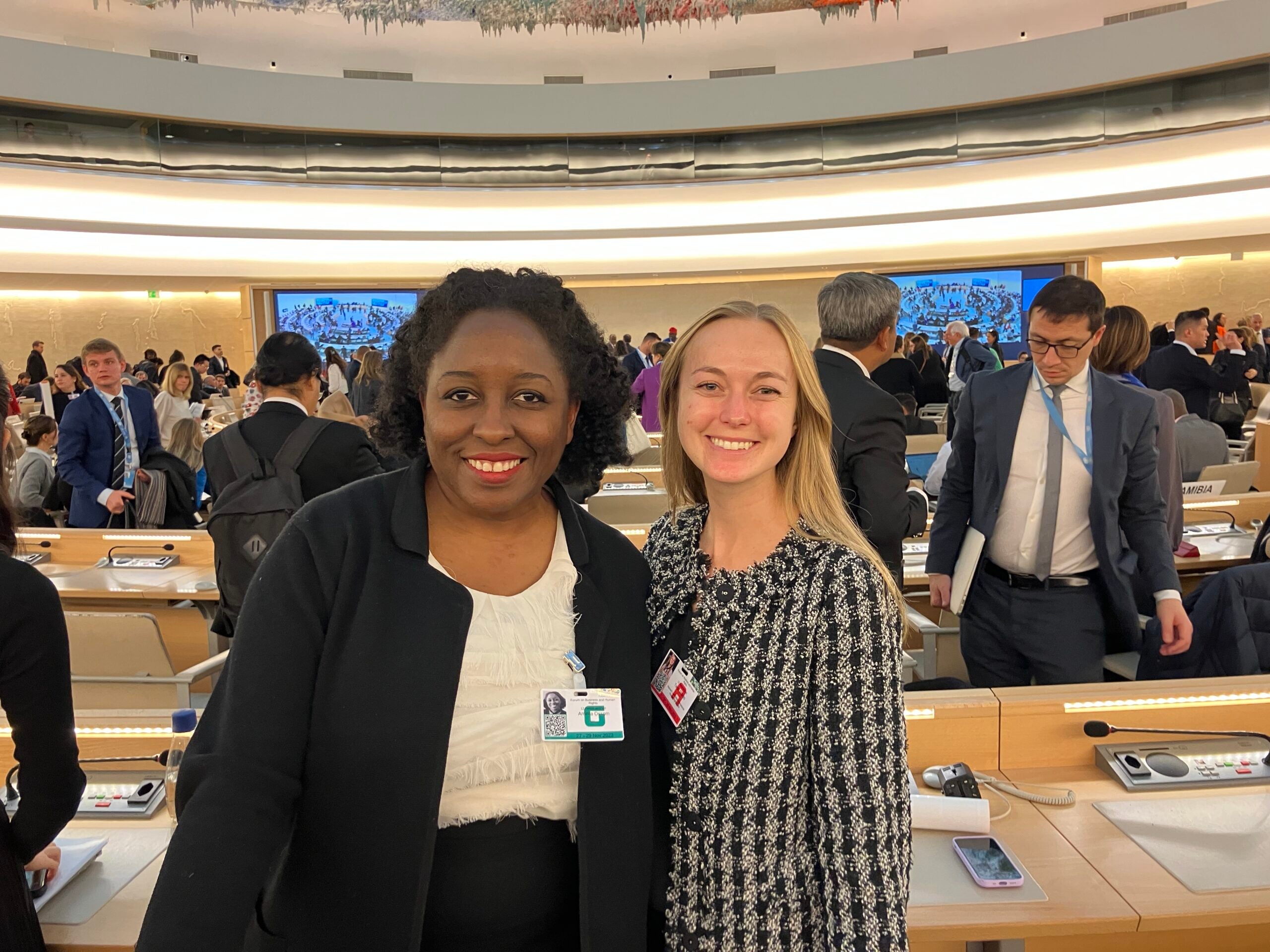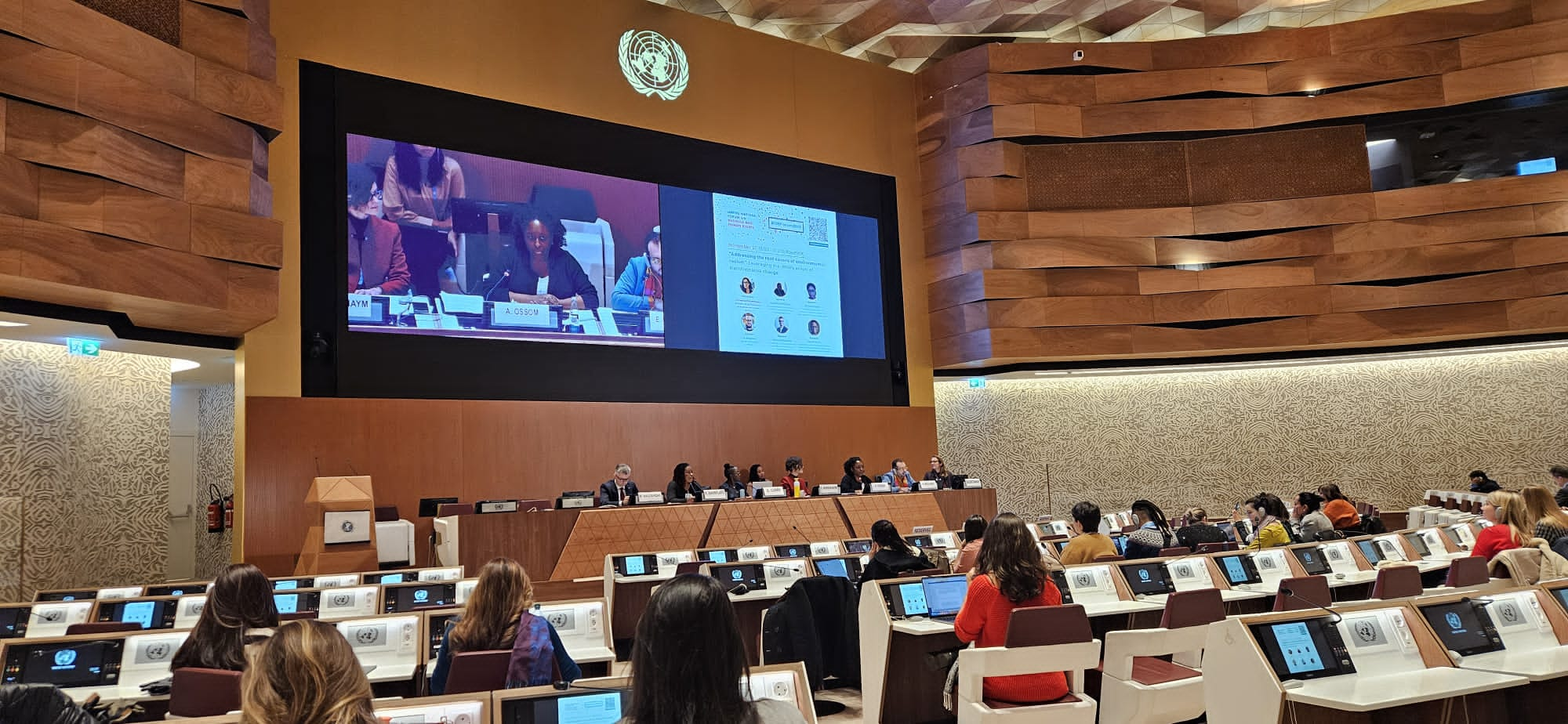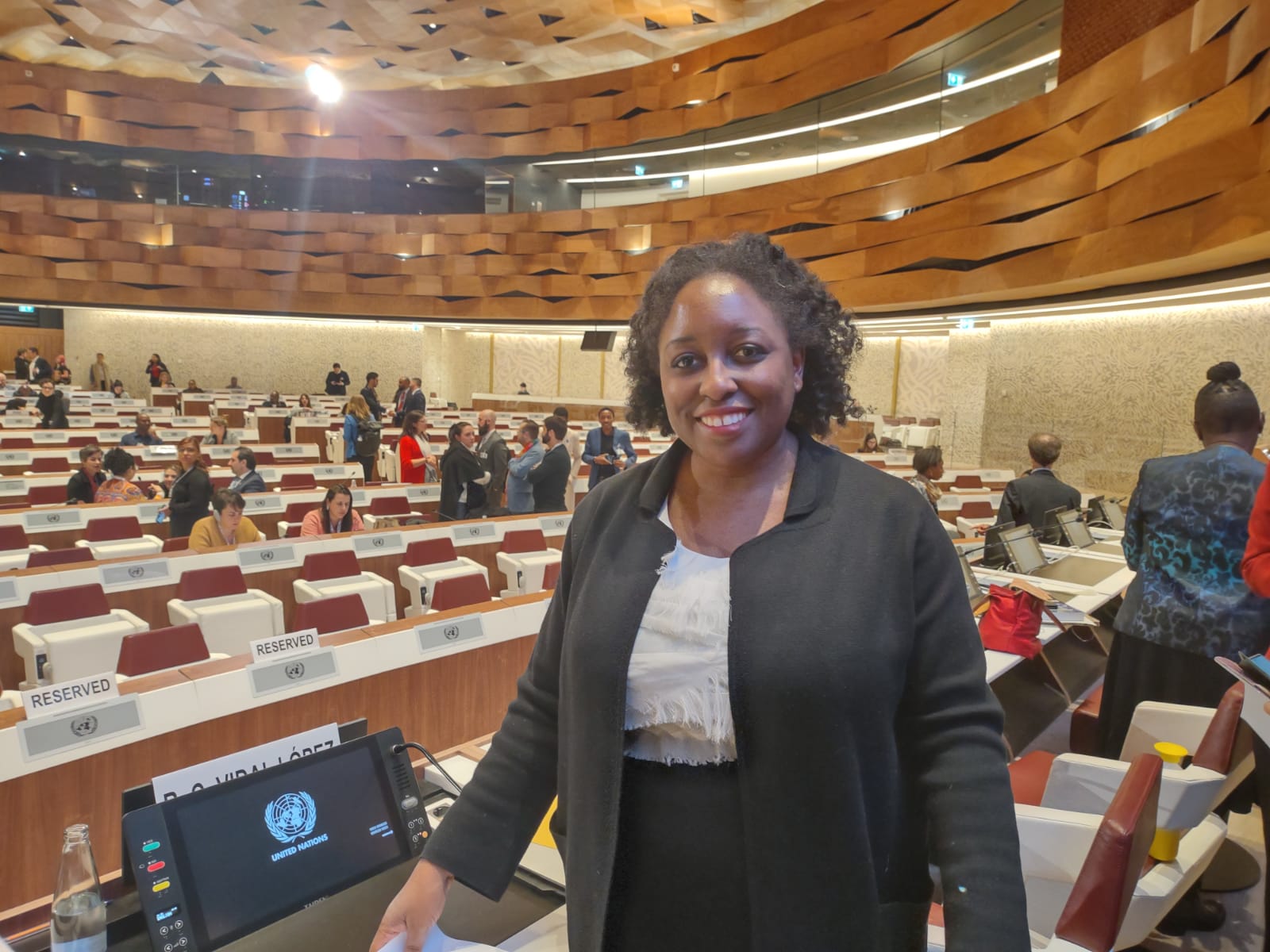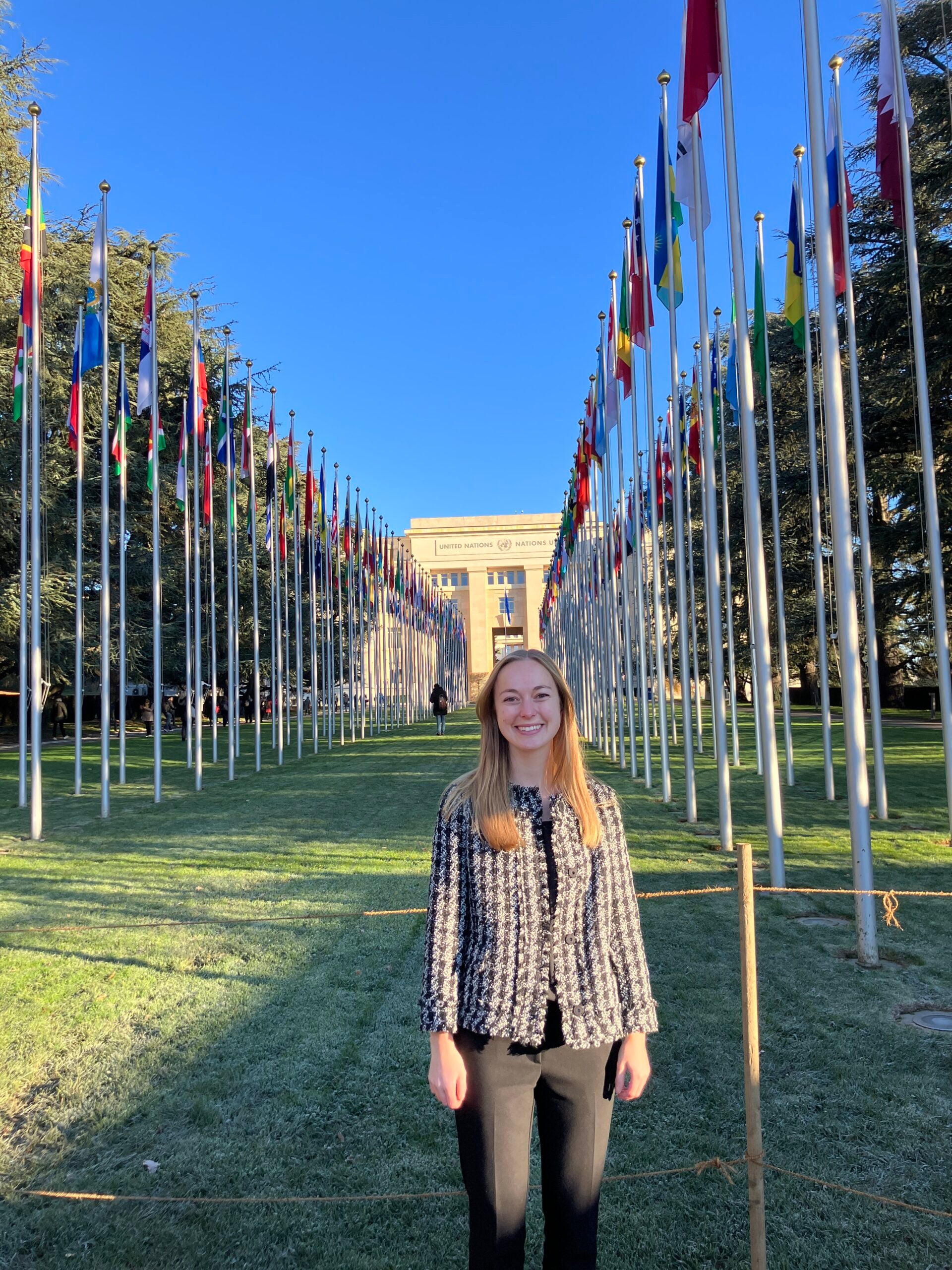Presenting research to UN officials, business and NGO leaders, and grassroots activists in Geneva, Switzerland is not an ordinary law school assignment; for Taryn Shanes ‘25, the task was not only part of her clinic work, but the “linchpin” of her law school experience.
Shanes travelled to Geneva this November with clinical instructor Aminta Ossom to share recommendations from the International Human Rights Clinic’s recent report, “When the Water Runs Dry: Human Rights, Climate Change & Deepening Water Inequality in Delhi, India,” at the International Forum on Business and Human Rights. The report calls for government intervention to prevent the worsening of water crises in vulnerable communities. At the Forum, which brings together a wide range of stakeholders to discuss pressing issues surrounding business impacts on human rights, Ossom discussed the report in a panel conversation about environmental racism, and she and Shanes shared the report’s findings with attendees from a variety of sectors.
We caught up with Ossom and Shanes to hear more about the experience at the Forum, the importance of bringing human rights reports to life, and their outlook on the current climate change and international human rights landscape.

Office of Clinical and Pro Bono Programs (OCP): Can you describe how this project came to the clinic and your work on the report?
Aminta Ossom: The work on this project began with a partnership that we had with the Center for Economic and Social Rights, which is an organization that helps grassroots activists and advocates conduct research on deprivations of economic and social rights, like the right to food, the right to water, the right to housing under international law. The clinic was exploring how to do advocacy on those rights, which are implicated by climate change, so we started working together.
At the beginning of the project, we did a lot of scoping research and literature reviews to understand how climate change impacts economic and social rights. We also worked with the Center to flesh out a type of research framework that they use to prove that these rights are violated. We wanted to apply the framework to a specific case or country where people are already working, so we connected with researchers in India, who had seen impacts of climate change in Delhi but hadn’t found ways to document that. We started a process of documenting that together, and we’ve been working on that for about four years. We produced the report in September, and this semester’s clinic work has been focused on sharing the report with other audiences, publicizing it and promoting the recommendations that are in the report.
OCP: What were the report’s findings and recommendations?
Ossom: We showed that the right to water was being violated by a failure to ensure that communities have equitable access to water. There are specific standards under the International Covenant on Economic and Social Rights which governments sign onto. They agree to ensure that everyone has equal enjoyment of water—especially for drinking and for domestic purposes—and that there should be equality in terms of water availability, quality, accessibility, and acceptability. We were looking at all those different indicators to understand whether the right to water was implicated by a failure to respond to climate change. We saw that the failure to extend water pipelines to particular communities, such as informal settlements, ended up causing them to have much less available, accessible, and quality water as compared to other communities. We also highlighted the responsibility of countries that have contributed to the climate crisis without regard for the impact on the rights of communities elsewhere.
OCP: Taryn, what did your work on this project in the clinic consist of?
Taryn Shanes ’25: This semester’s clinical team engaged in advocacy for the report, across three separate communities: the public, other human rights researchers, and governments. We thought about how to pitch the content of the report to different media audiences or to other NGOs, making the report’s findings applicable to different audiences. We worked on building a solid hook, and we thought about how the report’s findings would be relevant to current events in the world. We used that skill when we attended the Forum, where we were able to really build off hooks that were relevant both within the panels and the topics that were being discussed at the panels, and also in our one-on-one meetings with different advocates and stakeholders.
OCP: What were the clinic’s goals in attending this Forum?
Shanes: We wanted to share the clinical research, the report itself, and some of the broader themes that the earlier clinical team was able to work on in terms of broader scope of human rights and inequality that informed the report. One of our goals was skills-based learning and thinking about how to conduct one-on-one meetings and how to reach out to stakeholders, making sure that the information that you’re giving is engaging and relevant to your audience. I felt like that really came to a head in a great way at the Forum.

OCP: Aminta, you were a speaker on the panel “Addressing the Roots of Environmental Racism: Leveraging the UNGPs as a Tool for Transformative Change”. What were the objectives that you hoped to convey as a panelist?
Ossom: The organizers of the panel, the UN’s Working Group on Business and Human Rights, wanted to discuss how the UN guiding principles on business and human rights—known as the UNGPs, which are the international standards on how companies can respect human rights in their activities—relate to environmental racism. Each of the five panelists gave our different perspectives on the topic of how businesses can make sure that their activities don’t contribute to environmental racism. I first wanted to describe what that is—a phenomenon where people of color in the U.S., and racialized communities in other parts of the world, are disproportionately affected by environmental damage. I also wanted to show what companies can do to not contribute to that environmental damage and to the harms that those communities face.
One of my personal goals was to make sure that that was explained in a very easy to understand manner with concrete examples for audiences that are new to the topic, and then connect it to the international legal standards about how businesses should behave to respect human rights. It was a good opportunity to bring in the research that we did on India as a case study of one way that climate change is particularly affecting for a certain population. Our work looked at populations living in informal settlements. Many of those residents are people from the more marginalized castes in India, because of past housing discrimination.

OCP: Through the panel and through your conversations with other participants at the Forum, did you leave with any new insights about how the clinic’s work fits into the current international human rights landscape?
Ossom: One thing that I learned more about is the standards that different countries are adopting in their own legislation relating to what their own companies have to do to respect human rights. It was interesting to hear about how those guidelines are evolving to incorporate environmental considerations, especially because another one of our projects in the clinic is a collaboration with an environmental organization seeking corporate accountability for labor rights violations in the supply chain of the seafood industry. I went there with my climate change and environment mindset, but then learned a lot of new legal developments that would be applicable to work which the clinic does in other areas.
Shanes: The consideration given not only to our substantive research findings, but also to the methodologies that were used to get there, was surprising to me. During our bilateral discussions, there was a lot of interest in utilizing the methodology we had used for businesses, to make sure that their activities don’t impact these economic and social rights issues that we were highlighting.
OCP: Can you describe the importance of on-the-ground advocacy opportunities when publishing a human rights report or launching a new advocacy campaign?
Ossom: From my perspective, I think it’s super important. I’ve had experiences in the past where you produce a report that makes legal arguments, and then it gets put on a website, and no one knows that it’s there. Being able to give that report legs by showing other audiences how it’s applicable to their work and trying to influence governments and corporations to do better makes more of an impact on the ground. You have to introduce it to all these different people who could actually make change.
OCP: After having these conversations about climate change in international human rights, how did you leave the Forum feeling?
Shanes: I felt pretty optimistic. This was my first foray into a big UN forum, and being able to experience that for the first time was a great law school learning experience personally. Topically, I was also feeling bolstered, especially by the robust conversations during the panels.
Ossom: One of the challenges that we noticed is that it’s unique to be in this space, and not a lot of grassroots human rights advocates are able to come to Geneva and benefit from these discussions. So, I was struck by how distant the international legal standards could be from the people who are experiencing the impacts, but also optimistic after seeing ideas for how to better bridge those connections and how a clinic could be well positioned to help communities that don’t have a lot of resources.

OCP: Taryn, as a current law student, what was it like to get to travel to Geneva and interact with UN officials, businesses, and other stakeholders?
Shanes: It’s my first time doing this sort of work, so even just sitting in the panels and being able to learn about these up-and-coming issues would have been a great learning experience in and of itself. To not only attend and learn, but also actively engage in advocacy around our report, was the linchpin of my experience. It was incredibly formative to be able to hone the skills that I was learning throughout the clinic while at the Forum.
I also have been thinking more about this as part of my law school experience and thinking about the law as one tool in change-making. There are also so many other tools in the business and human rights contexts. There were a lot of really awesome legal discussions, but there were also so many discussions about norm building, human rights fact-finding, and various topics that are adjacent to the law or can supplement the law. It was great to be able to engage in the legal perspective and also have all of these other topics present at the Forum. I felt like I was able to really engage with my own legal analysis and think about how that can supplement these topics in furthering the business and human rights goals that came up at the Forum.
Filed in: Clinical Spotlight
Contact Office of Clinical and Pro Bono Programs
Website:
hls.harvard.edu/clinics
Email:
clinical@law.harvard.edu
